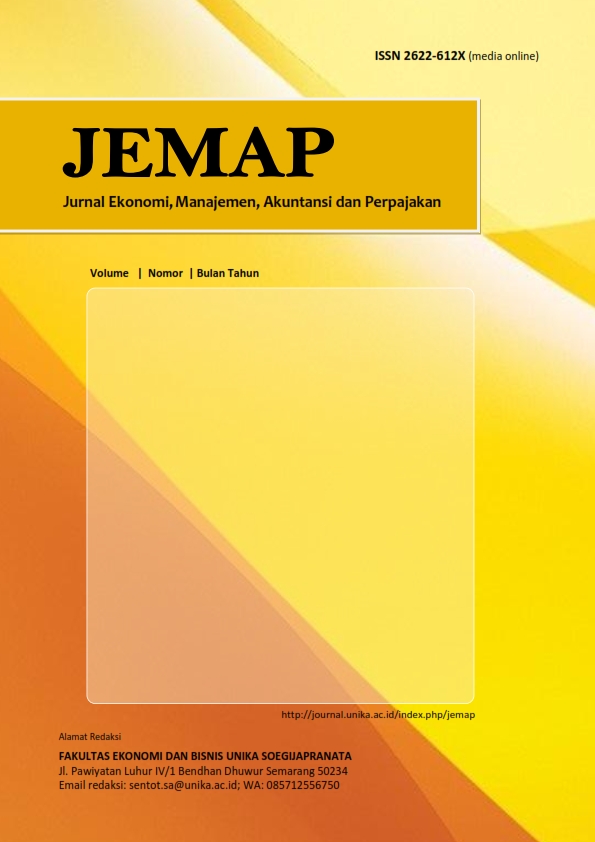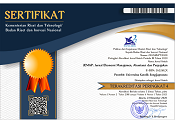Apakah Belanja Daerah Mampu Memoderasi Pengaruh Kondisi Sosial Dan Ekonomi Masyarakat Terhadap Kepatuhan Pajak Di Daerah Provinsi?
Abstract
Keywords
Full Text:
PDF (Bahasa Indonesia)References
Agustina, A., Wahyuni, S., & Asrida, A. (2024). Pengaruh pertumbuhan ekonomi dan indeks pembangunan manusia terhadap penerimaan pajak (analisis data tahun 2012-2023). Jurnal Ekonomika, 16(1), 7–13. https://doi.org/10.51179/eko.v16i1.2567
Aji, F. B., & Sbm, N. (2021). FAKTOR-FAKTOR YANG MEMPENGARUHI PAJAK DAERAH KOTA SEMARANG. DIPONEGORO JOURNAL OF ECONOMICS, 10(1), 1–12. https://ejournal2.undip.ac.id/index.php/dje
Alwi, M., Su’un, M., & Amiruddin. (2021). The effect of poverty levels and perkapita income on regional tax revenue and audit opinion with community confidence as intervening variables towards indonesian regional governments. Economos :Jurnal Ekonomi Dan Bisnis, 4(1), 54–65. https://jurnalpertanianumpar.com/index.php/economos/article/view/780/414
Asmarani, N. G. C. (2020, March 23). Apa itu kepatuhan pajak? DDTC News.
Ayunda, W. P., Azlina, N., & Sofyan, A. (2015). Pengaruh Sanksi Perpajakan, Pengetahuan Pajak, Sikap Wajib Pajak, dan Tingkat Ekonomi terhadap Kepatuhan Wajib Pajak dalam Membayar Pajak Bumi dan Bangunan dengan Kontrol Petugas Kelurahan sebagai Variabel Moderating di Kota Pekanbaru. Jurnal Online Mahasiswa Fakultas Ekonomi Universitas Riau, 2(2), 1–15. https://www.neliti.com/publications/34101/pengaruh-sanksi-perpajakan-pengetahuan-pajak-sikap-wajib-pajak-dan-tingkat-ekono
Beeri, I., Zaidan, A., & Zeedan, R. (2022). Willingness to pay taxes through mutual trust: The effect of fairness, governability, tax‐enforcement and outsourcing on local tax collection rates. Governance, 35(4), 1229–1252. https://doi.org/10.1111/gove.12662
Berutu, M. I. A., & Kuntadi, C. (2023). Pengaruh Jumlah Penduduk, Tingkat Inflasi dan Pertumbuhan Ekonomi Terhadap Penerimaan Pajak Daerah. INNOVATIVE: Journal Of Social Science Research, 3(4), 4751–4758. https://j-innovative.org/index.php/Innovative/article/view/3552/2915
Bhakti, A. P., Mariatul Aini, Purwanto, Adriyanto, Bhimantara Widyajala, Agung Widiadi, Kindy R. yahrir, Imam Mukhlis Affandi, Britany Alasen Sembiring, Ilham Hadiana, Purwandi Santoso, Isnanto Wimboro Dahrojatun Catur Panggih Pamungkas, Poppy Suprapti, Irfan Sofi, Sigit Wahyu Kartiko, Ganjar Prihatmoko, Nanag Garendra Timur, Amrul Yusroni, Rossi Rizki Bestari, … Netta An’amta Desli Sanati. (2022). Laporan perkembangan ekonomi dan fiskal daerah. https://djpk.kemenkeu.go.id/wp-content/uploads/2023/09/LPEFD_Edisi_XL___Agustus_2023_fin.pdf
BPS RI. (2023a). Indeks Pembangunan Manusia. https://www.bps.go.id/id/publication/2023/05/16/ef80bec78ab91cb5b703b943/indeks-pembangunan-manusia-2022.html
BPS RI. (2023b). Statistik Keuangan Pemerintah Provinsi. https://www.bps.go.id/id/publication/2023/12/21/64368d768c8e41ce119aabda/statistik-keuangan-pemerintah-provinsi-2022-2023.html
BPS RI. (2023c, July 17). Gini ratio menurut provinsi dan daerah. Badan Pusat Statistik. https://www.bps.go.id/
BPS RI. (2023d, July 17). Persentase Penduduk Miskin (P0) Menurut Provinsi dan Daerah (Persen). BPS RI.
BPS RI. (2024a). Proporsi Lapangan Kerja Informal Menurut Provinsi, 2021-2023. https://www.bps.go.id/id/statistics-table/2/MjE1MyMy/proportion-of-informal-employment-in-total-employment-by-province.html
BPS RI. (2024b, April 30). Produk Domestik Regional Bruto Provinsi-Provinsi di Indonesia menurut Pengeluaran. BPS RI. https://www.bps.go.id/id/publication/2024/04/30/9385278595f148282c3d1051/produk-domestik-regional-bruto-provinsi-provinsi-di-indonesia-menurut-pengeluaran--2019-2023.html
Budiman, N. A., Novi Antika, F., & Mulyani, S. (2021). Determinan Kepatuhan Wajib Pajak UMKM Di Kabupaten Kudus. Jurnal Kajian Akuntansi Dan Auditing, 16(1), 15–28. https://doi.org/10.37301/jkaa.v16i1.32
Chang, T., Liu, W. R., & Caudill, S. B. (2002). Tax-and-spend, spend-and-tax, or fiscal synchronization: new evidence for ten countries. Applied Economics, 34(12), 1553–1561. https://doi.org/10.1080/00036840110103265
Darmayasa, I. N., & Aneswari, Y. R. (2016). The Role Of Local Wisdom to Tax Compliance. Jurnal Akuntansi Multiparadigma, 7(1). https://doi.org/10.18202/jamal.2016.04.7010
Dewantoro, D. A. (2022). Pengaruh Pajak Daerah dan Retribusi Daerah Terhadap Kemandirian Keuangan Daerah. Journal of Innovation in Management, Accounting and Business, 1(2), 38–47. https://doi.org/10.56916/jimab.v1i2.174
Dharmawan, I. (2024, May 14). Memahami perbedaan pajak pusat dan pajak daerah. Pajak.Go.Id. https://www.pajak.go.id/index.php/id/artikel/memahami-perbedaan-pajak-pusat-dan-pajak-daerah#:~:text=Pada%20tingkat%20Provinsi%2C%20pajak%20daerah%20seperti%20Pajak%20Kendaraan,atas%20Tanah%20dan%20Bangunan%20%28BPHTB%29%20menjadi%20sumber%20pendapatan.
DJP RI. (2024). 86. Rasio pajak (tax ratio) dari masa ke masa. Pajak.Go.Id. https://www.pajak.go.id/id/86-rasio-pajak-tax-ratio-dari-masa-ke-masa
DJPK Kemenkeu. (2024). Data Series APBD 11 Januari 2024 . DJPK Kemenkeu. https://djpk.kemenkeu.go.id/?p=5412
Ermawati, E., & Aswar, K. (2020). Assessing Regional Finance Independence in Indonesian Local Governments. European Journal of Business and Management Research, 5(1). https://doi.org/10.24018/ejbmr.2020.5.1.178
Ernawati, E., Tajuddin, T., & Nur, S. (2021). Does Government Expenditure Affect Regional Inclusive Growth? An Experience of Implementing Village Fund Policy in Indonesia. Economies, 9(4), 164. https://doi.org/10.3390/economies9040164
Evi, T. (2016). The Effect of Taxpayer Compliance Against Increasing The Tax Revenue Agency . International Journal of Economic Perspectives, 10(2), 84–92. https://dosen.perbanas.id/docs/wp-content/uploads/2020/08/Jurnal-The-Effect-of-Taxpayer-Compliance.pdf
Freeman, R. E. (2010). Strategic Management. Cambridge University Press. https://doi.org/10.1017/CBO9781139192675
Gangl, K., & Torgler, B. (2020). How to Achieve Tax Compliance by the Wealthy: A Review of the Literature and Agenda for Policy. Social Issues and Policy Review, 14(1), 108–151. https://doi.org/10.1111/sipr.12065
Handayani, R. (2023, December). Rasio gini: Alat ukur ketimpangan ekonomi di Indonesia. Pajak.Com. https://www.pajak.com/ekonomi/rasio-gini-alat-ukur-ketimpangan-ekonomi-di-indonesia/
Harefa, M., Permana, S. H., Mangeswuri, D. R., & Meilani, H. (2017). Optimalisasi kebijakan pajak daerah (Carunia Mulya Firdausy, Ed.; 1st ed., Vol. 1). Yayasan Pustaka Obor Indonesia. https://berkas.dpr.go.id/puslit/files/buku_tim/buku-tim-public-78.pdf
Heider, F. (1958). The psychology of interpersonal relations. John Wiley & Sons Inc. https://doi.org/10.1037/10628-000
Heider, F. (2013). The Psychology of Interpersonal Relations. Psychology Press. https://doi.org/10.4324/9780203781159
Indah Nursyamsiah. (2021). Desentralisasi fiskal, belanja modal, dan pajak daerah terhadap kemandirian daerah [Akuntansi Syariah, UIN Raden Mas Said Surakarta]. https://eprints.iain-surakarta.ac.id/
Jaya, I. M. L. M. (2020). Metode penelitian kuantitatif dan kualitatif. Anak Hebat Indonesia.
Kalaš, B., Mirović, V., & Andrašić, J. (2017). Estimating the Impact of Taxes on the Economic Growth in the United States. Economic Themes, 55(4), 481–499. https://doi.org/10.1515/ethemes-2017-0027
Kaltra. (2024). Sejarah Kalimantan Utara. Provinsi Kalimantan Utara. https://kaltaraprov.go.id/profil/sejarah
Kirchler, E., & Braithwaite, V. (2007). The Economic Psychology of Tax Behaviour. Cambridge University Press. https://doi.org/10.1017/CBO9780511628238
Kurniati, D. (2023, September 30). Kemenkeu ungkap dampak UU HKPD pada penguatan kapasitas fiskal daerah. DDTC News. https://news.ddtc.co.id/kemenkeu-ungkap-dampak-uu-hkpd-pada-penguatan-kapasitas-fiskal-daerah-1797509
Kurniawan, T. S., Sari, D. W., & Irmawati, D. R. (2020). Analisis Pengaruh Realisasi Belanja Pemerintah Terhadap Penerimaan Pajak di Indonesia. Indonesian Treasury Review: Jurnal Perbendaharaan, Keuangan Negara Dan Kebijakan Publik, 5(3), 171–181. https://doi.org/10.33105/itrev.v5i3.212
Laksmi P, K. W., Darsana, N. M. L. A. P., & Ariwangsa, I. G. N. O. (2022). Pengaruh penerapan e-samsat, kualitas pelayanan fiskus dan sosialisasi perpajakan terhadap kepatuhan wajib pajak di kota Denpasar. Jurnal Ilmiah Akuntansi Dan Bisnis, 7(1), 150–157. https://doi.org/10.38043/jiab.v7i1.3401
Lind, E. A. (2001). Fairness heuristic theory: Justice judgments as pivotal cognitions in organizational relations. https://www.researchgate.net/publication/239987517
Mahwiyah, M., Khotimah, H., & Betara, S. (2023). Pengaruh audit pajak dan kepatuhan wajib pajak terhadap peningkatan tax ratio di kantor pelayanan pajak tangerang selatan. Jurnal Lentera Akuntansi, 8(1), 207–217. https://doi.org/10.34127/jrakt.v8i1.851
Napitupulu, R. B., Tobing, C. E. R. L., Simanjuntak, T. P., Hutabarat, L., Damanik, H., Harianja, H., & Sirait, R. T. M. (2021). Penelitian Bisnis, Teknik dan Analisa dengan SPSS-STATA-Eviews (1st ed.). Madenatera.
Nguyen, T. H. (2022). The Impact of Non-Economic Factors on Voluntary Tax Compliance Behavior: A Case Study of Small and Medium Enterprises in Vietnam. Economies, 10(8), 179. https://doi.org/10.3390/economies10080179
Nicola, R. N., & Saleh, M. (2023). Pengaruh produk domestik regional bruto (PDRB), belanja modal dan jumlah penduduk terhadap penerimaan pajak daerah di kabupaten banjar. JIEP: Jurnal Ilmu Ekonomi Dan Pembangunan, 6(2), 995–1007. https://doi.org/https://doi.org/10.20527/jiep.v6i2.11080
Ogoun, S., & Ekpulu, G. A. (2020). Educational Level and Tax Compliance: Empirical Evidence From Nigeria. International Journal of Accounting and Financial Reporting, 10(1), 160. https://doi.org/10.5296/ijafr.v10i1.16106
Puspita, D., Pahlevi, M., Raharja, M. Y., Hadi, S., Baroto, A. L., Permana, A. W., Rahayu, W. T., Prasetiya, F., Chalil, T. M., & Soewardi, T. J. (2021). Dua dekade implementasi desentralisasi fiskal di Indonesia editor. https://fiskal.kemenkeu.go.id/files/buku/file/1661139200_buku_dua_dekade_desentralisasi_fiskal.pdf
Raffi, G. D. Al, & Kuntadi, S. (2023). Pengaruh Kepatuhan Wajib Pajak, Kesadaran Wajib Pajak, dan Pemeriksaan Pajak Terhadap Penerimaan Pajak Penghasilan. Innovative: Journal Of Social Science Research, 3(4), 4659–4666. https://doi.org/https://doi.org/10.31004/innovative.v3i4.3404
Ramdhan, M. (2021). Metode Penelitian. Cipta Media Nusantara.
Riyadi, S. P., Setiawan, B., & Alfarago, D. (2021). Pengaruh Kepatuhan Wajib Pajak, Pemeriksaan Pajak, dan Pemungutan Pajak terhadap Penerimaan Pajak Penghasilan Badan. Jurnal Riset Akuntansi & Perpajakan (JRAP), 8(02), 57–67. https://doi.org/10.35838/jrap.2021.008.02.16
Salsabil, I., & Rianti, W. (2023). Pengaruh Pertumbuhan Ekonomi, Tingkat Pendidikan, Tingkat Kesehatan dan Laju Pertumbuhan Penduduk terhadap Tingkat Kemiskinan di Provinsi Jawa Barat pada Tahun 2016 – 2020. Jurnal Riset Ilmu Ekonomi Dan Bisnis, 15–24. https://doi.org/10.29313/jrieb.v3i1.1886
Saraswati, N. P., & Nurharjanti, N. N. (2021). Pengaruh pajak daerah, retribusi daerah, belanja modal dan dana perimbangan terhadap kemandirian keuangan daerah. Prosiding BIEMA (Business Management, Economic, and Accounting National Seminar), 51–64.
Sihombing, P. R. (2022). Aplikasi STATA untuk statistisi pemula (1st ed.). Gemala. https://www.researchgate.net/publication/358460661_Aplikasi_STATA_Untuk_Statistisi_Pemula
Sinaga, M. M. (2023, October 12). AEOI dan Penanganan Sektor Informal untuk Naikkan Tax Ratio. DDTC News.
Sugiyono. (2018). Metode Penelitian Bisnis : Pendekatan Kuantitatif, Kualitatif, Kombinasi dan R&D (1st ed.). Alfabeta.
Sukmalalana. (2020). Analisis Terhadap Efektivitas Belanja Daerah Untuk Meningkatkan Pembangunan Manusia. https://berkas.dpr.go.id/pa3kn/buku/public-file/buku-pka-public-12.pdf
Wildan, M. (2021, December 15). Rasio pajak daerah belum optimal, begini catatan kemenkeu. DDTC News. https://news.ddtc.co.id/rasio-pajak-daerah-belum-optimal-begini-catatan-kemenkeu-35288
Wulandari, D., & Wijaya, S. (2023). The Tax Revenue from Agriculture and Manufacturing Sectors in Lower Middle-Income Countries with Exchange Rate as a Moderating Variable. Ilomata International Journal of Tax and Accounting, 4(3), 508–523. https://doi.org/10.52728/ijtc.v4i3.798
Yohana, I., & Wibowo, S. (2019). Pengaruh Lingkungan Sosial, Tingkat Pendidikan Dan Tingkat Pendapatan Terhadap Kepatuhan Wajib Pajak Orang Pribadi Dalam Membayar Pajak Bumi Dan Bangunan(Studi Kasus Pada Wajib Pajak Orang Pribadi Di Desa Tegalangus). AKUNTOTEKNOLOGI: JURNAL ILMIAH AKUNTANSI DAN TEKNOLOGI, 11(2), 1–12. https://jurnal.buddhidharma.ac.id/index.php/akunto/article/view/279/149
Zainudin, F. M., Nugroho, R., & Muamarah, H. S. (2022). Pengaruh Kepercayaan Kepada Pemerintah Terhadap Kepatuhan Pajak Dengan Persepsi Keadilan Pajak Sebagai Variabel Intervening. JURNAL PAJAK INDONESIA (Indonesian Tax Review), 6(1), 107–121. https://doi.org/10.31092/jpi.v6i1.1616
DOI: https://doi.org/10.24167/jemap.v8i1.13406
Refbacks
- There are currently no refbacks.
e-ISSN 2622-612X | View My Stats







